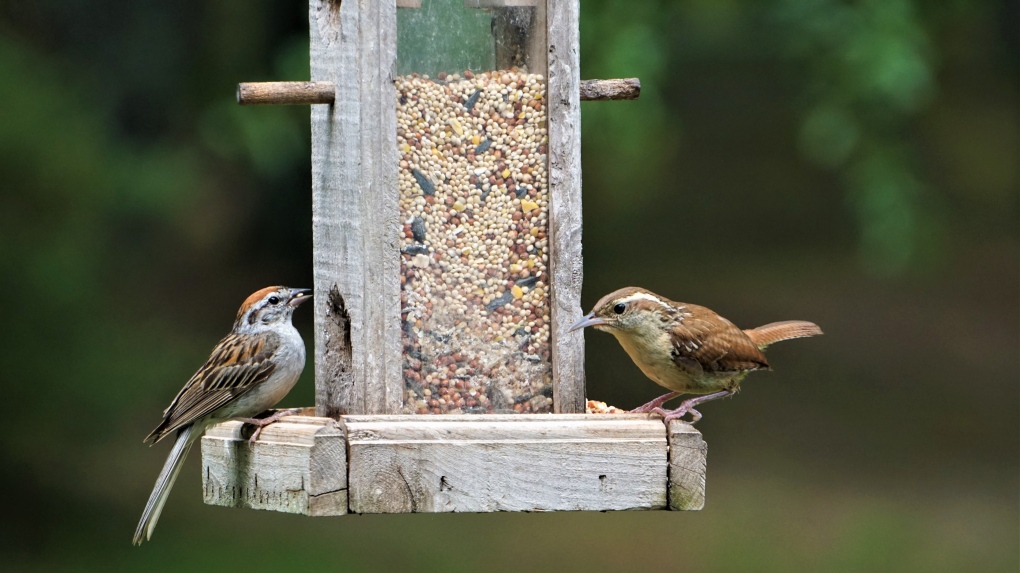'Rapid' spread of avian flu cases prompts call from SPCA for B.C. residents to remove bird feeders
 A bird feeder is seen in this undated image. (Shutterstock)
A bird feeder is seen in this undated image. (Shutterstock)
With dozens of confirmed avian flu cases among wild birds in B.C., the provincial SPCA is urging residents to temporarily remove bird feeders to stop the rapid spread of the disease.
The SPCA issued a noticed Wednesday saying positive samples have been confirmed in the Lower Mainland, Vancouver Island, Interior and Northern B.C. According to data from the Canadian Food Inspection Agency, 44 cases have been confirmed in wild birds the province.
Avian influenza, also known as the "bird flu," can infect many species. The SPCA said horned owls, bald eagles, great blue herons, ducks, geese and a crow have been affected locally. Thousands of birds from local poultry flocks have also been impacted.
"The virus is shed by infected birds through feces and respiratory secretions and is very resilient – the virus can survive in the environment for several months and continue to infect other birds," the SPCA said in a statement.
"Bird feeders facilitate the spread of the disease by encouraging unnatural congregations of birds and attracting other wildlife including predators and rodents."
The SPCA is asking residents to temporarily remove their bird feeders and empty any bird baths to mitigate the spread of the disease.
The animal welfare agency said the virus can cause disease in humans in rare occasions, particularly if they've had close contact with infected birds or contaminated areas.
While the request to remove bird feeders is temporary, the SPCA said it recommends only putting them out between October and March, because there are many natural feeding opportunities for birds in the spring and summer.
Hummingbird feeders have the lowest risk because they're species-specific, but owners should regularly change the nectar and clean the feeders to prevent deadly fungal outbreaks.
Residents can also watch for symptoms of sick birds, the SPCA said.
"Sick birds may appear lethargic, unusually 'fluffed up,' have nasal discharge, coughing and/or sneezing, diarrhea, or have excessively watery eyes or swelling of the head, neck and eyes," the organization said.
Anyone who sees a sick bird can contact the SPCA at 1-855-622-7722 for advice.
CTVNews.ca Top Stories

King Charles III focuses Christmas message on healthcare workers in year marked by royal illnesses
King Charles III used his annual Christmas message Wednesday to hail the selflessness of those who have cared for him and the Princess of Wales this year, after both were diagnosed with cancer.
Azerbaijani airliner crashes in Kazakhstan, killing 38 with 29 survivors, officials say
An Azerbaijani airliner with 67 people onboard crashed Wednesday near the Kazakhstani city of Aktau, killing 38 people and leaving 29 survivors, a Kazakh official said.
Second storm incoming for Christmas Day in southern B.C.
Environment Canada has issued a new series of weather warnings for British Columbia’s south coast Christmas morning.
What is Christmas like for Quebec health-care workers who stay on the job?
Most Quebecers get together with family and friends on Christmas Eve, but many professions require people to remain on the job at all times, including health-care workers.
Montreal man dead after boat explodes in Fort Lauderdale
A Montreal man is dead and several others are injured after a boat exploded in Fort Lauderdale, Florida.
Mother-daughter duo pursuing university dreams at the same time
For one University of Windsor student, what is typically a chance to gain independence from her parents has become a chance to spend more time with her biggest cheerleader — her mom.
Trial of man accused in Trump assassination attempt in Florida pushed back to September
A man accused of attempting to assassinate President-elect Donald Trump in South Florida won't be tried until September 2025, a federal judge ruled this week.
Pope urges 'all people of all nations' to silence arms and overcome divisions in Christmas address
Pope Francis in his traditional Christmas message on Wednesday urged 'all people of all nations' to find courage during this Holy Year 'to silence the sounds of arms and overcome divisions' plaguing the world, from the Middle East to Ukraine, Africa to Asia.
Read Trudeau's Christmas message
Prime Minister Justin Trudeau issued his Christmas message on Tuesday. Here is his message in full.
































